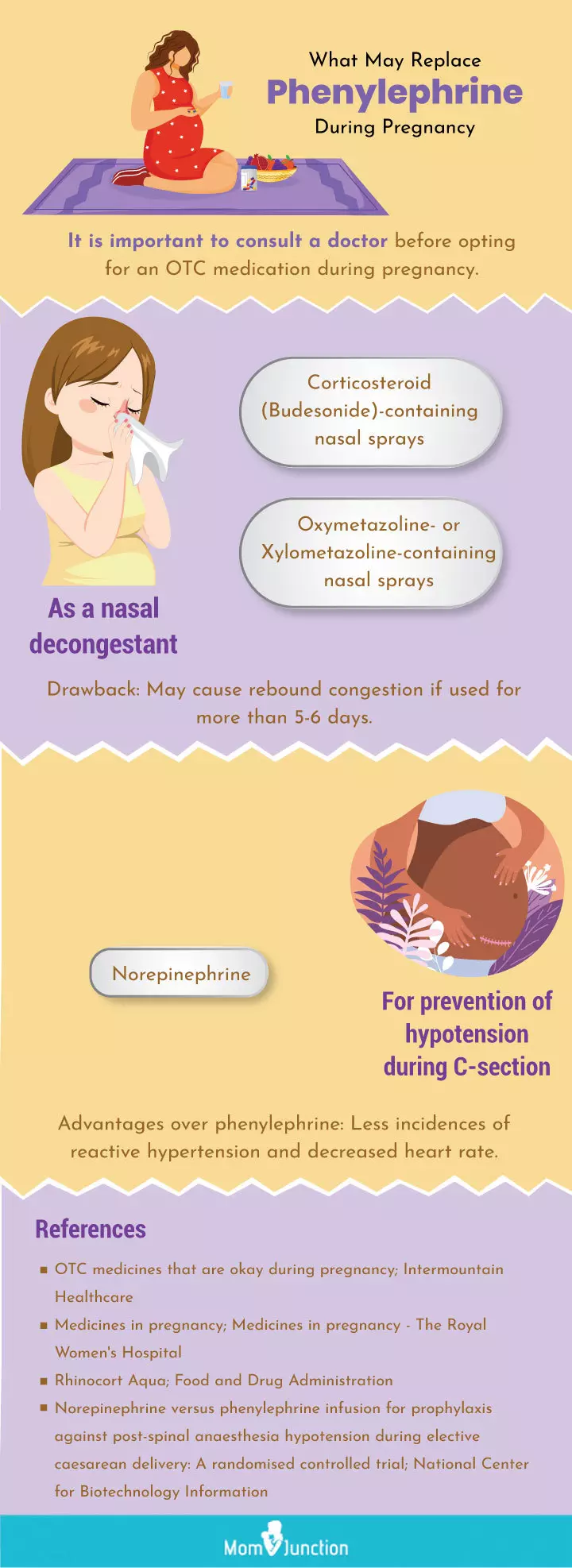
Image: ShutterStock
Phenylephrine, an ingredient of over-the-counter (OTC) nasal decongestants, can also be used to control hypotensioniA condition of low blood pressure, sometimes leading to dizziness and fainting occurring during C-sections done under spinal anesthesia (1). However, researchers are not entirely sure of the safety and efficacy of using phenylephrine when pregnant.
Some studies show that using phenylephrine in the first trimester may cause congenital disabilitiesiA structural or functional abnormality present from birth in the baby; however, other studies do not find any risk involved in its usage. Therefore, you should seek a doctor’s advice before using a nasal decongestant containing phenylephrine while pregnant.
Read this post to know about phenylephrine in detail, including its side effects and safety during pregnancy.
Key Pointers
- Phenylephrine-containing decongestants may increase the risk of birth defects, but confirmation through further research is needed.
- Possible adverse effects of phenylephrine use during pregnancy include anxiety, an elevated heart rate, and insomnia.
- Phenylephrine is found in OTC medications such as Tylenol, Sudafed PE, and Codral Day and Night.
- If any negative effects arise from taking phenylephrine, it is important to contact your doctor immediately.
Are Phenylephrine-containing Decongestants Safe During Pregnancy?

If you wish to use a decongestant to ease nasal congestion, and wonder, ‘Is phenylephrine safe during pregnancy?’ The answer is- it is not clearly known if phenylephrine in oral decongestants can cross the placenta and affect the fetus. But it’s vasoconstrictingiThe narrowing of blood vessels, leading to decreased blood flow and increased blood pressure property might constrict uterine blood vessels, which may cause birth defects. However, when administered intranasally, for localized effect, phenylephrine carries less risk than when given systemically (2).
Some studies state that the use of phenylephrine as a decongestant in the first trimester might slightly increase the risk of birth defects. However, a few other studies did not find anything to this effect (3).
Another case study supported the hypothesis that the use of phenylephrine as a nasal decongestant in the first trimester increased the risk of endocardial cushion defectiA defect in the formation of the walls and valves of the heart resulting in fatigue, infections, and an irregular heartbeat (2). But it did not find any association between first-trimester exposure to phenylephrine and ear, eye defects, and club foot in the baby.
There are thus no adequate studies to prove if maternal use of phenylephrine during pregnancy could cause adverse effects on fetal growth or developmental delays. A medical resource paper by the American Academy of Family Physicians states that decongestants should be used sparingly during pregnancy until further research is done (4). So, always check with your doctor before using a nasal decongestant containing phenylephrine to ensure safe prenatal care.
Phenylephrine As A Vasopressor During Pregnancy
Phenylephrine (Vazculep) is also used to treat hypotension, but it should be used on a doctor’s advice to ensure the medications’ safety and appropriate dosage recommendations.
The US Food and Drug Administration (FDA) classified intravenous phenylephrine as a Pregnancy Category C drug. It states that there are no adequate studies to determine the safety of intravenous phenylephrine on maternal health during pregnancy. So, your doctor would prescribe it only when the potential benefits outweigh the risks (5).
 Experts say
Experts sayWhat Happens If You Take Too Much Phenylephrine?

Prolonged drug exposure or overdosing can worsen or may cause the return of your nasal decongestant (6).
Also, an overdose of phenylephrine can cause a rise in blood pressure and reflex bradycardiaiA condition of decreased heart rate due to insufficient oxygen in the cells . It may also result in symptoms such as irritability, headache, nausea, and vomiting (7).
 Caution
CautionWhat Are The Side Effects Of Phenylephrine?

Some of the common side effects of this drug are:
- Loss of appetite
- Tingling and redness under the skin
- Insomnia
- Skin rash and itching
The following are some elaborate side effects of phenylephrine.
- Fast pounding and uneven heartbeat
- Dizziness and anxiety
- Weakness, fever, chills and body aches
- High blood pressure (or hypertension), seizures, headache, blurred vision (8)
 Quick fact
Quick factIf you experience side effects, then stop using the drug, and see a doctor.
What Are Some Of The OTC Drugs That Contain Phenylephrine?

Some of the brand names of oral drugs that contain phenylephrine are.
- Contac Cold and Flu (9)
- Tylenol Sinus Plus Headache (10)
- Mucinex Fast-Max Cold and Flu (11)
- Sudafed PE (12)
- Tylenol Cold and Flu Severe Day/Night (13)
- Codral Day and Night (14)
The following are some intranasal drugs that contain phenylephrine.
Frequently Asked Questions
1. What are some safe alternatives to phenylephrine during pregnancy?
Nasal drops or sprays of 0.9% sodium chloride and steam inhalation can help relieve nasal congestion in pregnancy. Alternatively, oxymetazoline or xylometazoline nasal decongestant sprays can be used for three to five days. However, it is recommended to seek your doctor’s advice for long-term solutions since prolonged use of nasal sprays can cause rebound congestion (17).
2. How much phenylephrine can I take while pregnant?
Avoid using phenylephrine in pregnancy since it may cause side effects. Only take it as per the doctor’s recommendation when the benefits outweigh the risks (18).
3. Does phenylephrine raise the heart rate in pregnancy?
Phenylephrine can raise your heart rate and cause abnormal rhythms in some cases. This may also make you feel your heartbeat (palpitations). Hence, it is not recommended for people with heart or blood pressure problems (18).
4. Can phenylephrine cause anxiety while pregnant?
Phenylephrine combined with certain other medications can trigger fear, restlessness, and anxiety in some people. Refrain from taking these medications and contact your doctor if you experience these symptoms (19).
5. Can phenylephrine make me sleepy while pregnant?
Phenylephrine can cause sleepiness in some women. If you experience sleepiness, stop using the medication and contact your doctor (20).
There are no adequate scientific studies to prove the safe use of the decongestant medication phenylephrine when pregnant. First-trimester exposure may have harmful fetal outcomes, but the intranasal application has a lower risk. Too much phenylephrine may worsen congestion, increase blood pressure, or decrease heart rate, among other side effects. Make sure you read product labels as several OTC preparations may contain this compound. It is advisable to always check with your doctor before using any OTC medication during pregnancy, as they may be harmful to you and your baby.
Infographic: Alternatives To Phenylephrine
Oral phenylephrine may not be suitable during pregnancy, especially if you have high blood pressure. Some alternatives are available, but using them as a nasal decongestant early in pregnancy (before 12 weeks) or for a long duration is not recommended. The infographic below tells you about the phenylephrine alternatives under different conditions. Illustration: Momjunction Design Team
Illustration: Can You Take Phenylephrine When Pregnant? Its Side Effects

Image: Stable Diffusion/MomJunction Design Team
Learn from this video about the benefits of OTC Phenylephrine, a medication used to treat nasal congestion and other symptoms. Get the facts on how it works and how to use it safely.
References
1. Sasima Dusitkasem, et al., Comparison of Phenylephrine and Ephedrine in the Treatment of Spinal-Induced Hypotension in High-Risk Pregnancies: A Narrative Review; NCBI (2017)
2. Wai-Ping Yau, et al., Use of Decongestants During Pregnancy and the Risk of Birth Defects; NCBI (2013)
3. Aida Erebara, et al.; Treating the common cold during pregnancy; NCBI(2008)
4. Jessica Servey, MD, Jennifer Chang, MD; Over-the-Counter Medications in Pregnancy; The American Academy of Family Physicians
5. Prescribing Information-Vazculep; The US Food and Drug Administration
6. Phenylephrine Nasal Spray; Medline Plus; U.S National Library of Medicine
7. A Justification for changing the current wording of the GSL classification of phenylephrine to include a cut-off point for solid dose products containing 10 mg or less of phenylephrine; Medsafe
8. Phenylephrine; Michigan Medicine; University of Michigan
9. Contac cold and flu day- acetaminophen and phenylephrine hydrochloride tablet; Dailymed
10. Tylenol Sinus Plus Headache Day; Dailymed
11. Mucinex Fast- Max Cold and Flu; Dailymed
12. Sudafed PE; Dailymed
13. Tylenol Cold+Flu Severe Day/Night; Dailymed
14. Codral Day & Night; Codral official website
15. Neo-synephrine Extra Strength; Dailymed
16. 4 Way Fast Acting; Dailymed
17. Medicine and pregnancy: what you need to know; The Royal Women’s Hospital
18. Phenylephrine; New Zealand Consumer Medicine Information
19. Chlorpheniramine; Phenylephrine oral tablet; Cleveland Clinic
20. Phenylephrine; MedlinePlus
20. Phenylephrine; NIH, NCBI
Community Experiences
Join the conversation and become a part of our nurturing community! Share your stories, experiences, and insights to connect with fellow parents.
Read full bio of Dr. Mozhgan Sayyad
Read full bio of shreeja pillai
Read full bio of Rebecca Malachi
Read full bio of Dr. Joyani Das

















